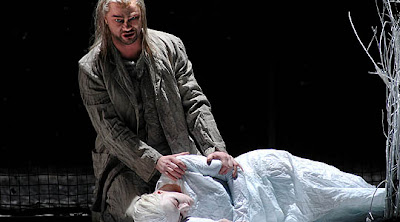Filmmaker Bernd Eichinger (from The Name of the Rose and Downfall) really does not know how to direct opera. On the other hand, he does know how to create a filmic backdrop, which is the essence of this Parsifal production opening to ferocious booing at the Berlin State Opera in 2005.
In brief, Eichinger´s Parsifal is a time travel initiated in space, where a backdrop projection of the earth accompanies the prelude.
The opera begins in a timeless ancient Egypt-looking setting for Act 1, amidst mighty broken pillars and naked tree-trunks.
Act 2 take place in an entirely abstract setting of a virtually naked stage playing on few sharp colour-contrasts. Video projections are used extensively, especially in the scene between Kundry and Parsifal, where we are presented with a flash-back through history accompanying Kundry´s tale of the Saviour.
Subsequently there is a major jump in time, transporting us to post-2001 New York City, in which a barbed fence separates the now aged Gurnemanz, Parsifal and Kundry from the City of two rivaling gangs. In the end, the gangs make peace and Kundry gets together with Parsifal. That the Grail was symbolized by Amfortas´ heart was one of the major controversial issues of this production, the New York gangs and the video-projections being the others.
In truth, Eichinger does not offer much in terms of individual characterization, not to speak of direction of the singers, which seem left entirely to their own devices within this epic film landshape. On the other hand, several of the singers cut very convincing figures on stage, and Eichinger´s production offers a fine background on which the music may shine. These qualities alone make it one of the best Parsifal productions on the circuit.
However, the main reasons to see this Parsifal are Daniel Barenboim and René Pape.
Daniel Barenboim´s Parsifal does not have the glittery brilliance of Christian Thielemann. What is has, however is even more compelling when heard live: It goes beyond the glitter and presents a dramatically engaged reading, which simply is riveting. All created by Barenboim´s usual dependence on rubato in a top-tuned string section. And what an orchestra, the Staatskappelle has become. Among the best in the world in this repertoire, no doubt.
That René Pape is absolutely smashing as Gurnemanz should hardly come as surprise. For once the stories of Gurnemanz are exciting and the long legato-lines lie perfect for his voice. Furthermore, the production allows him to wander around on stage with great authority as it basically suits him, I suppose. Nobody even approaches his artistic level in this part today, and I seriously wonder if there has been finer interpretations of Gurnemanz in history? In which case I have not heard them.
Daniel Barenboim´s Parsifal does not have the glittery brilliance of Christian Thielemann. What is has, however is even more compelling when heard live: It goes beyond the glitter and presents a dramatically engaged reading, which simply is riveting. All created by Barenboim´s usual dependence on rubato in a top-tuned string section. And what an orchestra, the Staatskappelle has become. Among the best in the world in this repertoire, no doubt.
That René Pape is absolutely smashing as Gurnemanz should hardly come as surprise. For once the stories of Gurnemanz are exciting and the long legato-lines lie perfect for his voice. Furthermore, the production allows him to wander around on stage with great authority as it basically suits him, I suppose. Nobody even approaches his artistic level in this part today, and I seriously wonder if there has been finer interpretations of Gurnemanz in history? In which case I have not heard them.
In February, Michelle DeYoung was Kundry. A fine voice, though not memorable and furthermore quite uninteresting on stage. In March, Kundry was Michaela Schuster, who seems to inhabit the role on stage, though with a rather rough voice. Throughout the run, Parsifal was played by Burkhard Fritz, quire unmemorable. Much more interesting Jochen Schmeckenbrecher as Klingsor and both Wolfgang Brendel and Hanno Müller-Brachmann were fine, though Amfortas perhaps is a bit too heavy for Hanno Müller-Brachmann.
Act 1:
Act 2:
Act 3:
Photographs from the company website.







No comments:
Post a Comment